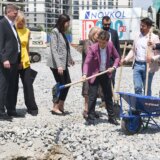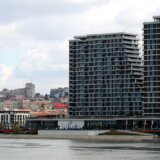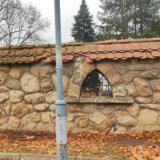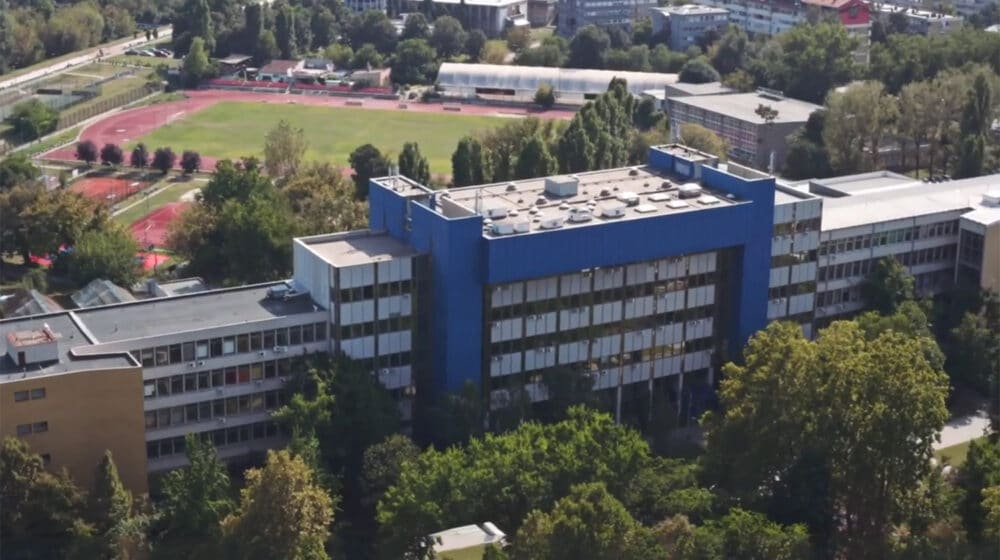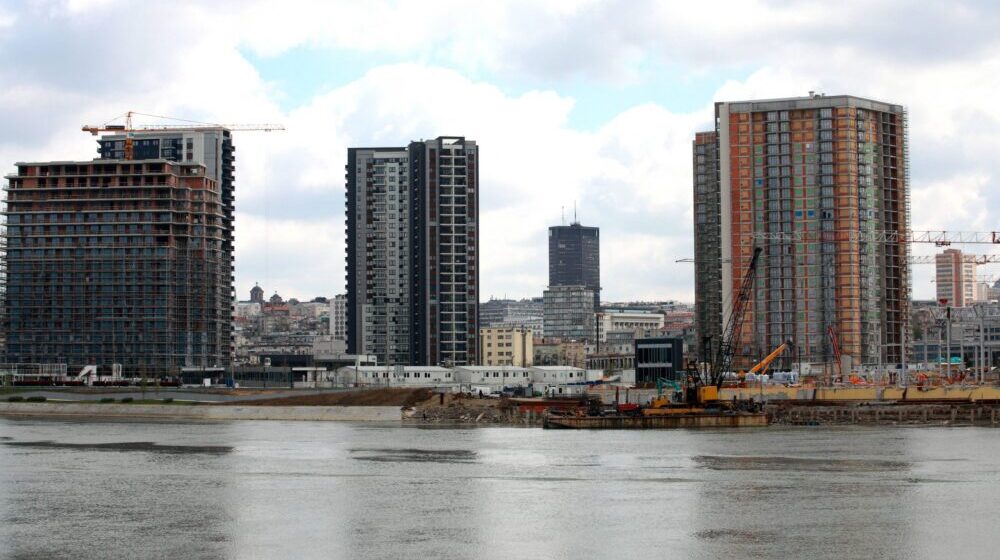 Foto: Beta/Miloš Miškov
Foto: Beta/Miloš MiškovBuduća najviša zgrada u prestonici, „Kula Beograd“, koja niče poslednje tri godine na obali Save u „Beogradu na vodi“ je kao i ceo kompleks probila nekoliko rokova – najpre ju je kao glavni deo arapsko-srpske bajke na savskoj obali najavio za dve i po godine još juna 2014. sada predsednik države Aleksandar Vučić.
For English version, please scroll down
On je tada rekao da će kao deo prve faze biti izgrađen i veliki šoping centar i da bi vrednost radova trebalo da bude milijardu evra. Bilo je to pre potpisivanja Sporazuma sa strateškim partnerom iz UAE kojim je predviđeno da izgradnja mini grada na reci traje maksimalno 30 godina, od čega polovina mora da se završi u prvih 20 godina.
Izgradnja Kule počela je krajem 2018. i tada je bilo reči o tome da će gradnja 168 metara ili 40 spratova visoke zgrade biti gotova do 2021. godine. Kula, međutim, još nije gotova, i neće biti najmanje do kraja jula naredne godine. Plan je da, kada jednom bude završena, u njoj budu hotel i apartmani Sent Redžis, dok bi na poslednjem spratu bio i najviši vidikovac u gradu.
Iako najavljeni u isto vreme, tržni centar je nešto ranije završen. Pun kapacitet, međutim, ni gotovo celu godinu otkad je otvorena, BW Galerija nije dostigla, jer je većina lokala u najvećem šoping-molu u Srbiji i dalje prazna.
Zakupci lokala verovatno čekaju da se bar deo od 6.000 stanova planiranih u Beogradu na vodi izgradi i dobar deo od 14.000 stanovnika useli u njih. Za sada Beograd na vodi je i dalje jedno veliko gradilište, koje je dobilo svoju promenadu i stanovnike u nekoliko zgrada.
Pre nego što će tokom pandemije svečano otvoriti Galeriju, Vučić je najavio kako će kada se ceo grad završi sve vredeti 10.000 puta više nego što je vredelo pre nego što je projekat počeo.
Na osnovu Sporazuma koji je država Srbija potpisala sa partnerima iz UAE ostalo je, međutim, nejasno koliko tačno novca svaka strana ulaže.
Vlada Srbije je aprila 2015. potpisala ugovor, kojim je predviđeno formiranje zajedničkog preduzeća, u kom će Srbija imati 32 odsto, a strateški partner 68 odsto. Osnivački ulog partnera bio je 22.000 evra, a ugovorne strane u projektu osim zajedničkog preduzeća i Vlade Srbije su i partneri iz UAE „Belgrejd Voterfront kapital investment“ i kompanija Al Maabar International Investments.
Srbija se ovim ugovorom obavezala da do juna 2016. raščisti zemljište i pripremi za početak radova, da obezbedi infrastrukturu, dok je s druge strane strani partner trebalo da uloži 300 miliona evra.
Nakon što je 147 dana posle potpisivanja, ugovor o zajedničkom ulaganju Srbije i strateškog partnera konačno i objavljen, naišao je na neodobravanje mnogih stručnjaka, pravnika pre svih, ali i aktivista iz nevladinih organizacija i medija.
Svih onih koji su bili najglasniji i onda kada je aprila 2016, neposredno pred istek roka ugovorom predviđenog za raščišćavanje terena, grupa organizovanih huligana pod fantomkama napravila čišćenje terena mimo svih zakona. Odgovorni za to nikada nisu pronađeni.
Ugovorom je osim raščišćavanja terena bilo predviđeno i da strateški partner umesto 3,5 milijardi evra koliko je vrednost ugovora uloži 150 miliona i dodatnih 150 miliona evra kredita.
Analizirajući ugovor u Inicijativi Ne davimo Beograd primetili su da se Srbija obavezala na kompletnu pripremu terena, dodatne pozajmice, dozvolila prenos prava korišćenja zemljišta u pravo svojine, prepustila strateškom partneru moć odlučivanja pri izradi planske dokumentacije, ali i da je poklonila privatnom preduzeću objekte i zemljište.
„Odriče se suvereniteta obavezujući se da ne menja zakone na štetu ugovora i to sve bez ikakvih garancija da će druga ugovorna strana realizovati dogovoreno“, navodi se u analizi ugovora Inicijative Ne davimo Beograd.
Između ostalog, ugovorom je predviđeno i da se zemljište da u zakup na 99 godina, ali će se nakon nekoliko godina izgradnje i prodaje stanova ispostaviti da zemljište, ipak, pripada onome koje zgradu napravio, što je svojevremeno rekao i tada gradonačelnik, sada ministar finansija Siniša Mali.
„Zemljište ispod zgrade pripada onom ko je tu zgradu napravio“, rekao je pre šest godina Mali i dodao da smo „mi dobili 32 odsto učešća u kapitalu“. Mali je tada rekao da – ili prodajete zemljište, što nisu hteli da urade, ili ga dajete bez naknade, ali postajete suvlasnik preduzeća i delite trećinu profita.
Profesor prava Zoran Ivošević kaže za Danas da se pre osvrta na pravni aspekt i analizu ugovora mora obratiti pažnja na činjenice, jedna je rušenje u noći između 24. i 25. aprila 2016. koje se desilo u Savamali, a druga ta da je rok prema ugovoru za raščišćavanje terena bio 30. jun te godine.
Obe govore o bliskom srodstvu, kako kaže, savamalske hajdučije sa ugovornim obavezama Srbije i privrednog društva Beograd na vodi prema strateškom partneru i garantu u UAE.
Ivošević kaže da se najpre treba osvrnuti na Ugovor o zajedničkom ulaganju u projekat Beograd na vodi koji je zaključen aprila 2013, a kojim se, kako ističe, ugađa interesima Emirata, što dovodi do sumnje o korupciji.
Za tu sumnju postoji, napominje Ivošević, više razloga.
Ukupni kapital društva Beograd na vodi čini milion evra plus iznos kojim će ta vrednost biti uvećana naknadnim udelima. Osnivački ulog Srbije je milion dinara u gotovini, a osnivački ulog strateškog partnera 22.000 evra u dinarskoj protivvrednosti, napominje on.
Vlasnički udeo, ekonomska i glasačka prava raspoređena su tako da je 32 odsto u rukama Srbije, 68 odsto strateškog partnera. Ugovorne strane su se „bezuslovno i neopozivo dogovorile da se ekonomska i prava glasa Srbije i strateškog partnera neće umanjivati za iznos uloga u osnovnom kapitalu društva ili dodatnih uplata u Društvo od strane bilo kog člana“.
„Bezuslovno i neopozivo odricanje ugovornih strana od promena startnih ekonomskih prava i prava glasa ima za posledicu ekonomsku i pravnu nevidljivost dodatnih udela Srbije, čija vrednost višestruko premašuje osnivački i dodatni udeo strateškog partnera iz Emirata“, ističe Ivošević.
Ti udeli odnose se, napominje, na ustupanje gradskog građevinskog zemljišta i njegovo uređivanje, uložene objekte i njihovo renoviranje, raščišćavanje zemljišta, sanaciju životne sredine, ali i izgradnju komunalne infrastrukture i pružanje komunalnih usluga i dodatno finansiranje putem kredita.
Ivošević kaže da Srbija i strateški partner nisu ravnopravne ugovorne strane jer su njihova prava i obaveze u opreci sa principom jednake vrednosti uzajamnih davanja što nije u skladu sa članovima 11 i 12 Zakona o obligacionim odnosima.
„Tu nije kraj ugađanju emiratskom partneru. Ono se nastavlja davanjem građevinskog zemljišta u zakup bez naknade i konverzijom takvog zakupa u pravo svojine bez dodatnog plaćanja“, ističe Ivošević.
Prema Zakonu o obligacionim odnosima zakup je teretan dvostrano obavezan ugovor uz plaćanje zakupnine za korišćenje zakupljenog dobra u svojini zakupodavca. Zakup bez naknade je, napominje, simulacija teretnog pravnog posla kojim se skriva besplatno ustupanje gradskog građevinskog zemljišta strateškom partneru iz Emirata.
„Konverzija zakupa u pravo svojine bez naknade skriva besplatnu eksproprijaciju. Ona je suprotna Ustavu, a opet omogućena Zakonom o planiranju i izgradnji koji je kao leks specijalis usvojen aprila 2015. bez javne rasprave i po hitnom postupku, na predlog Vlade i kako piše u obrazloženju zbog rokova za završetak projekta Beograd na vodi“, naglašava Ivošević.
Podređujući pravni sistem strateškom partneru, kako kaže naš sagovornik, Ugovor o projektu Beograd na vodi je njegovim interesima prilagodio i upotrebu merodavnog prava i način rešavanja sporova.
„Pod merodavnim pravom ugovor je formalno proglasio propise Srbije, ali ih je odmah i neutralisao odredbama o podređivanju njegovih klauzula, o davanju prednosti međunarodnim konvencijama u sukobu sa nacionalnim pravom bez obzira da li su ratifikovane i o suspenziji prinudnih nacionalnih normi koje se odnose na osnivanje i upravljanje društvom Beograd na vodi“, napominje Ivošević.
Ugovor je predvideo, kako kaže, da se sporovi rešavaju pred Arbitražom u Beču.
„Ovde je reč o sporovima između ugovornih strana, ali kako u takve sporove ne spadaju i sporovi o ništavosti ugovora njih po ZOO može pokrenuti javni tužilac ili zainteresovano lice pred nadležnim nacionalnim sudom pošto oni nisu stranke u ugovoru. Toga se nisu setili“, napominje naš sagovornik.
Zoran Ivošević kaže da u skladu sa ovim zakonom nisu rešene još neke odredbe, poput one gde se Srbija obavezala „da će prodati određenu nepokretnu imovinu subjektima iz UAE“, što će biti regulisano posebnim kupoprodajnim ugovorom.
„Odredba u Sporazumu kojom se kaže da akti, programi i projekti zaključeni u skladu sa njim ne podležu javnim nabavkama, tenderima i javnim nadmetanjima nisu u skladu sa Ustavom naše zemlje koji zabranjuje ograničenje slobodne konkurencije i zloupotrebu monopolskog položaja“, kaže Zoran Ivošević.
Sadržaj je rezultat istraživanja sprovedenog u okviru projekta „Transparentnost učešća države u stranim investicionim projektima“. Stavovi izneti u tekstu su stavovi autora i ne izražavaju nužno stavove donatora.
ENGLISH VERSION
The Agreement with the Emirates, Incompatible with the Constitution and Laws of Serbia, Is Manifoldly Harmful to the Public Finances
The state has waived both the right to earnings and the right to vote in the Belgrade Waterfront Project
The future tallest building in the capital, „The Belgrade Tower“, which has been erected for the last three years on the right bank of the Sava River as a part of the „Belgrade Waterfront“ development project, as well as the entire complex, broke several deadlines. In June 2014, the current President, Aleksandar Vučić, announced that the Tower, as the flagship of the Arab-Serbian fairy tale on the Sava bank, would be completed in two and a half years. He then said that a large shopping center would be built as part of the first phase, and that the value of the works should amount to one billion Euro.
This was before the signing of the agreement with the strategic partner from the UAE, which stipulates that the construction of a mini city on the Sava River shall last a maximum of 30 years, and that half of the project must be completed in the first 20 years. The construction of the Tower began at the end of 2018, when it was said that the construction of the 168-meter or 40-storey high-rise building would be completed by 2021. However, the Tower is not finished yet, and it will not be at least until the end of July next year. The plan is that, once it has been finished, it becomes the home for St. Regis hotel and apartments, while the top floor will be the highest observatory point in the city.
Although announced at the same time, the shopping center was completed a little earlier. However, the BW Gallery has not reached its full capacity for almost a whole year since it was opened, because most of the stores in the largest shopping mall in Serbia are still empty.
The tenants of the premises are probably waiting for at least a part of the 6,000 apartments planned in the Belgrade Waterfront to be finished and a good part of the 14,000 inhabitants to move into them. For now, the Belgrade Waterfront is still a large construction site, which has its own promenade and residents in a couple of buildings.
At the formal opening of the BW Gallery during the pandemic, Vučić announced that, when the whole development project is finished, everything will be worth 10,000 times more than it was before the project started. However, it remained unclear exactly how much money each party to the Agreement the Serbian state signed with partners from the UAE will have eventually invested.
In April 2015, the Government of Serbia signed an agreement, which envisages the formation of a joint venture, in which Serbia will have 32 percent, and a strategic partner 68 percent. The founding share of the partners was 22,000 euros, and the contracting parties in the project, in addition to the joint venture and the Government of Serbia, are also partners from the UAE „Belgrade Waterfront Capital Investment“ and the company Al Maabar International Investments.
Under this agreement, Serbia undertook to clear the land by June 2016, prepare it for the start of construction works, and provide all necessary infrastructure, while, on the other hand, the foreign partner was supposed to invest 300 million euros.
When the agreement on the joint investment of Serbia and the strategic partner was finally announced 147 days after it had been signed, it was met with the disapproval of many experts, lawyers above all, but also activists from non-governmental organizations and the media. These same groups protested when in April 2016, just before the expiration of the deadline the Agreement stipulated for clearing the terrain, a group of organized hooligans wearing ski masks cleaned the terrain blatantly breaching the law. Those responsible have never been found.
The agreement, in addition to clearing the terrain, also provided for the strategic partner to invest 150 million euros and an additional 150 million euros in loans instead of the 3.5 billion euros that the value of the contract is.
When analyzing the agreement, the “Do Not Drown Belgrade Initiative” pointed to the fact that not only did Serbia commit to complete preparation of the terrain and to additional loans, but it also allowed the transfer of land use rights to ownership, left the decision-making power to the strategic partner in drafting planning documentation, and donated facilities and land to private companies.
„It renounces sovereignty, committing not to change any law to the detriment of the agreement, and all this without any guarantees that the other contracting party will realize their part of the agreement,“ the analysis of the agreement, which was carried out by the “Do Not Drown Belgrade Initiative” points out.
Among other things, the agreement stipulates that the land will be leased for 99 years, but, after several years of construction and sale of apartments, it has turned out that, after all, the land belongs to the one who made the building, as the then mayor, now Minister of Finance, Siniša Mali once said.
„The land under the building belongs to the one who has made that building,“ Mali said six years ago, adding that „we got a 32 percent share in the capital.“ Mali then explained that – either you sell the land, which they did not want to do, or you give it without compensation, but you become a co-owner of the company and share a third of the profit.
Law professor Zoran Ivošević says for Danas that, before reviewing the legal aspect and analysis of the agreement, one must pay attention to some of the facts: one is the demolition that took place in Savamala in the night between April 24 and April 25, and the other is that the deadline the contract for clearing the terrain was June 30 of that year.
Both speak of a close kinship, as he says, of the Savamala brigandage with the contractual obligations of Serbia and the Belgrade Waterfront company towards the strategic partner and guarantor in the UAE. Ivošević says that we should first look at the Agreement on Joint Investment in the Belgrade Waterfront Development Project, which was signed in April 2013, and which, as he points out, pleases the interests of the Emirates, which leads to suspicions of corruption.
There are several reasons for this suspicion, Ivošević notes.
The total capital of the company Belgrade Waterfront is one million euros plus the amount by which that value will be increased by subsequent shares. The founding investment of Serbia is one million dinars in cash, and the founding investment of a strategic partner is 22,000 Euro in dinar equivalent, he notes. Ownership share, economic and voting rights are distributed so that 32 percent is in the hands of Serbia, 68 percent belongs to the strategic partner. The contracting parties „unconditionally and irrevocably agreed that the economic and voting rights of Serbia and its strategic partner will not be reduced by the amount of shares in the base share capital of the company or additional payments to the company by any member.“
„Unconditional and irrevocable waiver of the contracting parties from the changes of the starting economic rights and voting rights results in economic and legal invisibility of additional shares of Serbia, whose value exceeds far the founding and additional share of the strategic partner from the Emirates,“ Ivošević points out.
He notes that these shares refer to the transfer of city construction land and its arrangement, invested facilities and their renovation, land clearing, environmental rehabilitation, but also the construction of communal infrastructure and the provision of communal services and additional financing through loans.
Ivošević says that Serbia and the UAE strategic partner are not equal contracting parties because their rights and obligations are in conflict with the principle of equal value of mutual benefits, which is not in accordance with Articles 11 and 12 of the Law of Contracts and Torts.
„This is not the end of pleasing the Emirati partner. It continues by leasing construction land without compensation and converting such a lease into ownership without additional payment,“ Ivošević points out.
According to the Law of Contracts and Torts, a lease is a bilaterally binding contract with the payment of rent for the use of the leased property owned by the lessor. He notes that the lease without compensation is a simulation of a burdensome legal transaction which hides the free transfer of city construction land to a strategic partner from the Emirates.
„Conversion of lease into property without compensation hides free expropriation. It is contrary to the Constitution, and yet enabled by the Law on Planning and Construction, which was adopted as a Lex Specialis in April 2015 without a public hearing and by urgent procedure, at the proposal of the Government and, as written in the explanation, due to the deadlines for the completion of the Belgrade Waterfront project „, Ivošević emphasizes.
By subordinating the national legal system to the strategic partner, as our interlocutor says, the Agreement on the Belgrade Waterfront Project adjusted the use of the applicable law and the manner of resolving disputes to the strategic partner’s interests.
„While the agreement formally refers to the national law of the Republic of Serbia as the applicable law, it immediately neutralizes it with provisions on its subordination, giving priority to international conventions that are in conflict with the national law, regardless of whether they have been ratified, and with provisions on the suspension of coercive national norms that should regulate the incorporation and management of the company Belgrade Waterfront“, notes Ivošević.
The agreement stipulates, as he says, that disputes will be resolved before the Arbitration in Vienna.
„These are disputes between the contracting parties, but, as such, disputes do not include disputes over the nullity of contracts under the Law of Contracts and Torts, they can be initiated by a public prosecutor or an interested party before the relevant national court because they are not parties to the contract. They did not remember that,“ our interlocutor said.
Zoran Ivošević says that in accordance with this law, some other provisions have not been resolved, such as the one where Serbia has committed „to sell certain real estate to entities from the UAE“, which will be regulated by a special purchase agreement.
„The provision of the Agreement which states that acts, programs and projects concluded pursuant to it are not subject to public procurement, tenders and public competition are not in accordance with the Constitution of our country, which prohibits restriction of free competition and abuse of monopoly position,“ said Zoran Ivošević.
The content is the result of the research carried out within the project „Transparency of State Participation in Foreign Investment Projects“. The views expressed in the text are those of the authors and do not necessarily reflect the views of the donor.
Pratite nas na našoj Facebook i Instagram stranici, ali i na X nalogu. Pretplatite se na PDF izdanje lista Danas.

